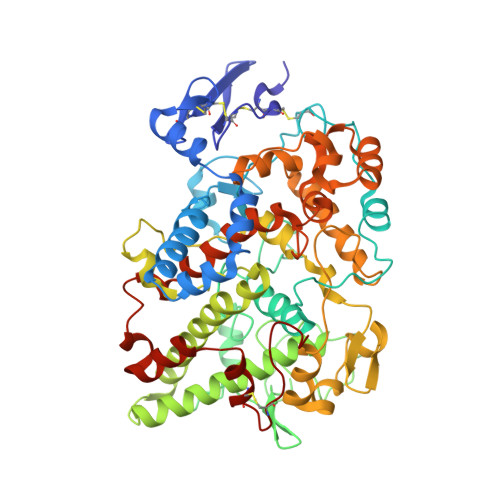Coxibs interfere with the action of aspirin by binding tightly to one monomer of cyclooxygenase-1.
Rimon, G., Sidhu, R.S., Lauver, D.A., Lee, J.Y., Sharma, N.P., Yuan, C., Frieler, R.A., Trievel, R.C., Lucchesi, B.R., Smith, W.L.(2010) Proc Natl Acad Sci U S A 107: 28-33
- PubMed: 19955429
- DOI: https://doi.org/10.1073/pnas.0909765106
- Primary Citation of Related Structures:
3KK6 - PubMed Abstract:
Pain associated with inflammation involves prostaglandins synthesized from arachidonic acid (AA) through cyclooxygenase-2 (COX-2) pathways while thromboxane A(2) formed by platelets from AA via cyclooxygenase-1 (COX-1) mediates thrombosis. COX-1 and COX-2 are both targets of nonselective nonsteroidal antiinflammatory drugs (nsNSAIDs) including aspirin whereas COX-2 activity is preferentially blocked by COX-2 inhibitors called coxibs. COXs are homodimers composed of identical subunits, but we have shown that only one subunit is active at a time during catalysis; moreover, many nsNSAIDS bind to a single subunit of a COX dimer to inhibit the COX activity of the entire dimer. Here, we report the surprising observation that celecoxib and other coxibs bind tightly to a subunit of COX-1. Although celecoxib binding to one monomer of COX-1 does not affect the normal catalytic processing of AA by the second, partner subunit, celecoxib does interfere with the inhibition of COX-1 by aspirin in vitro. X-ray crystallographic results obtained with a celecoxib/COX-1 complex show how celecoxib can bind to one of the two available COX sites of the COX-1 dimer. Finally, we find that administration of celecoxib to dogs interferes with the ability of a low dose of aspirin to inhibit AA-induced ex vivo platelet aggregation. COX-2 inhibitors such as celecoxib are widely used for pain relief. Because coxibs exhibit cardiovascular side effects, they are often prescribed in combination with low-dose aspirin to prevent thrombosis. Our studies predict that the cardioprotective effect of low-dose aspirin on COX-1 may be blunted when taken with coxibs.
Organizational Affiliation:
Department of Biological Chemistry, University of Michigan, Ann Arbor, MI 4810, USA.























